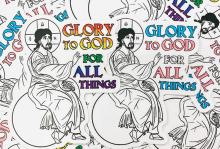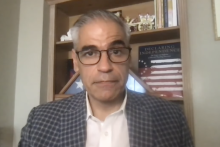pride

It was a simple wave that changed things for Frankie Leigh. Last summer’s Douglas County Pride festivities were wrapping up. It had been eight hours in near 90-degree heat, eight hours of picketers yelling at Leigh that they were going to hell. And just as the crowds were scattering, a protester called to Leigh. “See you next year!” Leigh couldn’t help but laugh. “It was that realization of like, I am going to see you every year,” Leigh said. “And I’ll probably see you in the grocery store and at the school board meeting and at these other places, too.”

“To live fully and authentically.” It’s a phrase that resonates for me as someone who came into their queerness later in life. For a long time, the possibility of living fully and authentically felt just beyond my reach; I felt I was skimming the surface of my being and longed to be fully immersed — soaked and drenched — in who I am. But I was afraid. What would living authentically mean for my place in the world? As a second-generation Korean American who has long struggled to be seen and accepted, I wondered if being queer would foreclose this possibility.

Sid High is a trans Christian in Iowa and a youth ambassador for Beloved Arise. He spoke with Sojourners’ Mitchell Atencio.
I REALLY SUPPRESSED my trans identity before I came out. For me, that wasn’t accepting myself as my true self. There’s something to be said for being who you are without having to hide who you are for the approval of others. I feel more at peace with myself because God is pleased with me for being who I am and living in my authentic self. God wanted me to be who I am and to be able to show other people that they can be who they are too.
I started the first Pride event [in Marion, Iowa] when I was 15. That’s when I started getting interested in helping the community more. People often see the queer community as sinners. Even if people do believe it’s a sin, the right thing to do is not to judge and to continue to love — because that’s what Jesus did. God is Love, and [God] made us to love, regardless of who we love.

ACCORDING TO AN Orthodox miracle story, St. Nicholas — the fourth century archbishop who inspired the figure of Santa Claus — quieted a raging sea. When sailors were caught in a storm on the Mediterranean, they called out for help. Nicholas appeared, walking on the waves before them. He blessed the ship, and the storm calmed. This is why he became the patron saint of sailors. It’s also why Mary Marza, a queer Orthodox artist in her mid-20s who is based in Los Angeles, illustrated St. Nicholas as a “waterbender.” Waterbenders, from the animated series Avatar: The Last Airbender, can control water and its movements. This is one of many works featured on her Instagram art account, Art of Marza.
“I liked the concept of blending saints with the elements or just blending the saints with things from my favorite stories and pop culture,” Marza wrote in an Instagram caption about this portrayal of St. Nicholas.
Marza (who asked to use her art account name instead of her real last name for this article) creates digital art and stickers that blend Orthodox iconography and prayer with street art and anime. The grungy, graffiti-and-animation-inspired aesthetic of her art and its confluence with iconography is part of her longing to “[see] God in places where people assume we can’t find Him,” she wrote on Instagram.

Shepherding God, be palpably present with us when we dance, snuggle, and enjoy the sensations of the creation you declare good.
Help us to name, define, redefine, deconstruct, claim, and properly pronoun our fabulousness. We commit to properly naming and pronouning the fabulousness of others.

Earlier this year, the Vatican said that its priests and ministers cannot bless same-sex unions. For LGBTQ Catholics, this was a setback for what many saw as the church’s more welcoming trajectory under Pope Francis. But not everyone is following the instructions; in the United States and across the globe, Catholics have directly disobeyed the Vatican’s instructions.
On the first day of June — which marks the beginning of Pride Month in the United States — DignityUSA, an organization supporting LGBTQ Catholics, hosted a Catholic Pride Blessing, where LGBTQ Catholics could be blessed by clergy.

IN AUGUST, LEADERS of the United Methodist Church from around the world are scheduled to meet, in Minneapolis and/or online. The denomination’s future will be on the table as delegates address the decades-old debate about full inclusion of LGBTQI members, including in same-sex marriage and ordination. Meanwhile, congregations around the U.S. and elsewhere have taken various approaches to the pastoral realities of their members. Lydia Wylie Kellermann and her father, retired Methodist pastor Bill Wylie-Kellermann, explain what it meant to support each other through Lydia’s wedding and the ecclesial reverberations that followed. Editor's note: After this issue went to print, the UMC postponed the 2021 General Conference until 2022.
Lydia Wylie-Kellermann: This is a story about risk and fear. It is a story about love. And it’s about the moments when standing beside the ones you love becomes an act of justice. It is the kind of story that begs us to ask what it means to be church. It is an ordinary story turned holy by the common occurrence of the very personal moments of our lives interacting with structural injustice and the way resistance and love unfold.
Ten years ago, I married Erinn. It was in a political moment when gay marriage was illegal and most denominations were still forbidding it.
Yet we were clear that we were not merely roommates or partners, but that marriage was a vocation we were summoned to together. We had no doubt that our relationship was blessed by community and by God. We wanted to promise our lives to one another and publicly offer our marriage as a gift back upon community.
It was a moment of total clarity for me, yet it was also really scary. We had to climb the steps of the church fearing we would pass through a line of protesters. We entered the sanctuary feeling the loved ones missing in the pews because they couldn’t support our marriage. We walked hand in hand down the aisle, combatting our own internalized homophobia, showing our love publicly with hands, promises, and kisses.
We could not have done it without the love of community. The dearly beloveds who filled that church held our hearts and knees steady.
One of those people that stood beside us and laid his hands upon us was my dad. He loved us, celebrated us, and summoned God to move in and through the day and into the rest of our lives. He co-officiated our service. As an ordained Methodist pastor serving a spunky, activist Episcopal church, he was risking losing his orders and losing his job.
Bill Wylie-Kellermann: Those were real fears. For as long as I can remember, I had said to myself that if a member of my congregation asked me to preside at a same-sex wedding, one discerned in pastoral care, that I would certainly do it. I was navigating a contradiction in the United Methodist Book of Discipline that enjoined me to offer pastoral ministry to all members in my care but a couple of paragraphs later forbade me to offer sacramental care to particular parishioners. This marriage was essentially pastoral work, but one that functioned as a public action of civil and ecclesial disobedience. I took comfort in Jesus’ ministry, where a personal act of healing would publicly violate Levitical laws of purity, say, putting him in trouble.

Through their digital platforms, Beloved Arise is working to counter that message, telling youth from New York to Hawaii that they are loved “with no caveats, limitations, or exceptions.”

Rosado was one of the first people to be called the morning of June 12. The body count from the Pulse nightclub shooting was still unconfirmed, but as names started to be released, it was clear that most of the victims were Latinx, particularly of Puerto Rican descent. Many of their families only spoke rudimentary English, a secondary tongue not suitable to communicate the nuance of such tragic news. Rosado remembers how most of the hospital staff did not speak Spanish, and consistently mispronounced the Hispanic names of the victims.

On Sunday, June 28, the day of gay pride parades in Chicago and around the world, millions celebrated the recent United States’ Supreme Court decision that effectively legalized gay marriage at the national level. But David Wichman took his personal Pride rally to the General Admission (GA) line at the United Center.
With his hand-decorated rainbow flag in tow, he wanted to get a place close to the stage. His flag simply said: “IN THE NAME OF LOVE – THANK YOU!” Wichman wanted Bono and the band to know their work as allies had not gone unnoticed.
Dozens of fans bring their banners and signs to the GA floor on each night of the tour — but not every fan has their banner or sign lifted high by the lead singer onstage. As Bono had done in Arizona in May after the news of Ireland’s successful marriage referendum, he turned this spirited Sunday night show into a celebration of marriage (his wife Ali was in attendance), and a joyful tribute to the civil rights advocates who worked to make marriage equality a reality for the whole United States.

It was a rough week at work. It got off to a bad start and didn’t improve much. Maybe you’ve had one of those weeks.
It all started when one of my supervisor decided to observe me talking with a client. In my view, the conversation went really great. In fact, in the middle of our discussion, I literally thought, “I’m so glad my supervisor is witnessing this! I’ve built great rapport with the client, I’ve elicited his story, and he’s talking about his emotions and his relationships!” I decided that the universe was clearly on my side, because as we left, the client said, “Thank you so much for this conversation. I feel much better. You really brightened my day.”
In other words, I nailed it.
Then my supervisor wanted to debrief and provide some “constructive criticism.” After asking what I thought was good about the conversation, he proceeded to “should on” me. Have you ever been “should on?” It’s no fun. He said things like, “You should have done this,” “You should have done that,” “You shouldn’t have pushed so much with this,” “You should have noticed when he said this.” He said nothing positive about the conversation. Except at the end when he claimed, “You’re doing fine.”
Then I started to get critical.
“I’m doing fine?!?” I thought. “What does ‘fine’ even mean? Is that some kind of backhanded compliment? Fine is bland. It’s neither good nor bad. It’s like the word ‘interesting.’ I hate that word. Tell me what you mean by ‘INTERESTING!’ Well, in the context of this “constructive criticism,” fine apparently means that I’m not good.
And that’s when the voices came. I’ve had them before. I’m sure you’ve had them, too. It’s the voice of doubt that says, “Do you really think that you can do this? Well, you can’t. You’re a joke. You’ve been studying this and practicing this for six months, and you’re still making rookie mistakes. Even when you think you are doing great, you fail.” Then comes the kicker, “You aren’t good enough and you will never be good enough.”

I’m not sure, but I think my daughter, Zoe, is Jesus. For a couple of reasons. But before I talk more about her, let’s talk about me. You know, since I’m not Jesus and I like talking about myself.
I hate failing. Really hate it, even when it’s partly out of my control. Just a few days I wrote about how, for My Jesus Project month in which I’m working on “Jesus the Ascetic,” I was fasting from solid foods, giving away half of my possessions, practicing a new spiritual discipline each week, and reading through the Gospel of Matthew with an ascetic perspective.
A couple of days later, my doctor and dietician pulled me off of my fast because seizure symptoms had re-emerged. I felt like I had failed, and it took me a day or two to muster the courage to even write about it. Yes, part of the practice was about listening to my body. Yes, another part was to learn to distinguish between my wants and needs. But I had pride at stake — as evidenced by the bruising of said pride when I had to change my diet.
So in a way, the pride at the root of my practice actually was the bigger shortfall. I’m still eating vegan all month, abstaining from alcohol and refined sugar, but I had set a goal and made a public statement about it, and I didn’t want to admit I couldn’t do it.
Further, my mentor for the month, Reba Riley, called me out — not so much for the shift in diet (well, a little bit), but mostly because of my motivations behind the overall My Jesus Project practice and my motivations. I was struggling, not just with the perceived failure and resulting embarrassment, but also with the fact that I was busting my ass in this practice — far more so than I’ve ever done for a previous book. Despite grandiose expectations (always the seeds of premeditated resentment), the traffic and overall public response has been pretty lukewarm.
“Why are you doing this?” she asked.
“It seems to me,” I said, “that we talk a lot about following Jesus, but most of us don’t put a lot of serious energy into figuring out what that really means, day to day, myself included. So I’m taking a year to try and figure it out. And I’m trying to do it in a way that invites other folks to figure it out along with me.”
“And you’re writing about it.”
“Yeah,” I said.
"Let me put it this way. If no one else was watching, if you were doing this only for yourself, would you still do it?” she said.
THIS PAST MOVIE year I’ve been delighted by, among other things, nonviolent resolutions, a guy talking in a car, an Irish priest trying to do the right thing, and a five-dimensional bookcase. Here’s my list of the 10 best films of 2014 (many more are worthy, but 10 are all that will fit).
10. Pride. A delightful and stirring celebration of marginalized people turning their woundedness into helping others, as LGBTQ activists support the Thatcher-era British coal miners’ strike.
9. The Lego Movie. This turned out to be both the most unpredictably fun and one of the wisest films of the year. A brilliant critique of consumerism and political tyranny, with an ending that inverts the myth of redemptive violence.

THIS IS SURELY the most difficult beatitude. First, it’s hard to interpret. Does “meek” mean a Uriah Heep-like unctuous humbleness? Does it mean softness or gentleness or weakness? Are “the meek” the powerless, or perhaps the poor? Is their meekness to be displayed toward God, but not toward people? How meek is meek, and do you always have to let bullies kick sand in your face at the beach?
Next, what about “inherit”? That’s a legalistic term; who’s going to die so someone else gets an inheritance? Will the non-meek be pushed over a cliff so that only the meek are left? Or will the non-meek be lowered in status and the meek become rulers, thereby shedding their meekness?
And what about “the earth”? Another beatitude refers to the kingdom of heaven—the poor in spirit have it already, it seems—but “the meek” will instead inherit “the earth.” The material world.
Being Canadian, I memorized the beatitudes at school. But I wondered whether “the meek” had to be people. Could they be some other life form? Scottish physiologist J.S. Haldane felt God shows an inordinate fondness for beetles—having created so many—and my own father speculated that, if humankind destroyed itself by nuclear bombs or otherwise, the earth would be inherited by cockroaches. That would explain everything!

FOR MORE THAN two centuries, the United States has been the proudest example of democracy in the world. Maybe not the best, but definitely the proudest. Oh sure, we’ve hit some rough patches over the decades, mainly in dealing with our native peoples and other ethnic minorities. Also with women, the poor, the falsely accused, the unemployed, and people who aren’t bankers. But let’s just call those growing pains.
For the most part, America has been that shining city on a hill, and by America, of course, I don’t mean Canada or Mexico, or the other countries whose names I forget, most of which don’t have many good hills to shine from anyway.
But I’m not talking about geography, I’m talking about pride. The pride that comes from being number one in democracy, despite being number 55th in infant mortality and 35th in math. Okay, so we don’t test well. But we’re proud anyway. And we’re still number one in Bible science! [High five!]
But lately, because of continued dysfunction on Capitol Hill, people are starting to whisper that democracy in the United States may have lost some of its shine, like we’re “hiding it under a bushel,” as it says in the old Christian campfire song of my youth. (We also sang “With Jesus in My Boat I Can Ride Out the Current Economic Downturn,” and “Children, Go Where I Text Thee.”)
But if America’s “little light” is no longer shining, at least a few other nations are providing good examples of self-government.

Let those who boast, boast in this, that they understand and know me, that I am the Lord; I act with steadfast love, justice, and righteousness in the earth, for in these things I delight, says the Lord.” (Jeremiah 9:24, NRSV)
Pride has taken many forms in my life, but most dangerously in this: I have taken myself far too seriously. You wouldn’t think that a neurotic worrier who spent eight years in therapy would be full of pride. But for years I was utterly consumed with anxiety over what would happen in my life, because I believed that it should go a certain way and that I had both the responsibility and ability to bring that about.
So there’s nothing like having your worst fear come true — 19 months* of unemployment in a bad economy — to show you how small you really are, especially compared to God.
It was kind of amazing.

Editor's Note: This post was adapted from Sunday's message at The District Church in Washington, D.C.
Psychiatrist M. Scott Peck writes in his book The Road Less Traveled that one of the stages of growing up is “giving up the distorted images of one’s parents” — in other words, realizing that they’re not perfect. This also holds true for other leaders in our lives. We learn that our political leaders, our youth group leaders, our mentors, our teachers aren’t perfect. This isn’t always a bad thing, because sometimes we feel like our leaders let us down, but it’s actually because we had unrealistic expectations of them — such as being perfect, such as never making mistakes, such as not doing everything you want them to do.
(Pretty much nobody I know does everything I want them to do. That doesn’t make them failures; that makes me have to examine what kind of expectations I’m putting on them!)
So I’m not talking about that kind of let-down. I’m talking about those situations we’ve all experienced where we’ve been let down by some kind of failure on the leader’s part. Just this week, Pastor David Yonggi Cho, the founder of one of the largest churches in the world — 750,000 people, and he’d been pastor there for almost five decades — was found guilty of embezzling almost $12 million . I’m talking about that kind of let down. I’m talking about:
- a father who wasn’t present—physically or emotionally,
- a pastor who had an affair,
- a youth leader who ended up turning away from God.
Those are the ones that are most devastating, right? But it doesn’t even have to be that dramatic. It could be a small group leader who wasn’t present when you were going through something, a supervisor or boss at work who doesn’t listen or seem to care.

Two weeks after we arrived in Portland, Amy (my wife and new senior pastor at First Christian Church in downtown Portland) decided she needed to do something meaningful to express her voice as a person of faith in the community. There already were the folks handing out tracts down on the campus of Portland State University, which is definitely not us. There were plenty of community leaders to meet, hands to shake and even media outlets to connect with so we’d have a better handle on key circles of influence.
But none of what was really what we had in mind.
The annual Pride fest was taking place that weekend along the banks of the Willamette River, and we knew we should probably go. Folks in our new congregation are in various stages in their journey of discerning where they are with regard to sexual orientation, but overall, it’s an incredibly open and loving place for all people. There are gay singles and couples who attend regularly, and who participate in leadership and other ministries like everyone else. But the fact of the matter is that most people outside the walls of the church don’t know that. And honestly, how will they ever know if we’re not willing to tell them?
Better yet, why not show them?